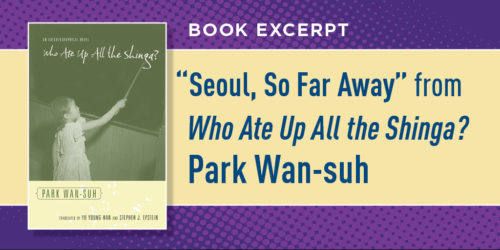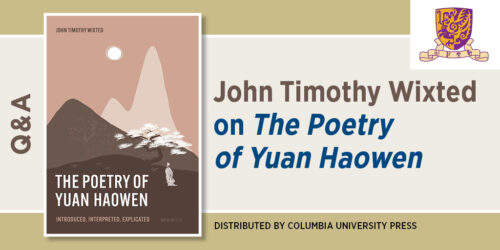The Power of Female Same-Sex Love
Stephen Roddy and Ying Wang

In premodern China, descriptions of homoeroticism can be found in multiple examples of histories, poetry, fiction, and drama, but nearly all of these treat exclusively male-male relations. On female same-sex desire, the written record is almost completely silent. The few exceptions, such as Pu Songling’s (1640–1715) tale “Feng Sanniang,” Shen Fu’s (1762–after 1803) Six Records of a Floating Life, and Cao Xueqin’s (1715? –63?) The Dream of the Red Chamber (or alternatively, The Story of the Stone), deal with women in love with one another in a peripheral manner, and in the latter two examples, only in passing. Li Yu’s 1651 chuanqi drama, The Fragrant Companions, is the sole example of a portrait of female same-sex desire and love before the twentieth century.
An Invaluable Source on Female Same-Sex Love in Imperial China
The dearth of literary works on this subject is both puzzling and challenging. It may suggest that female same-sex love “did not constitute a significant source of anxiety for men,”[1] who authored the vast majority of historical and literary writings in premodern times. Or it could simply be that evidence of such relations does exist, but the texts or other materials have been overlooked by modern readers and scholars. Whichever is the case, this vacuum tells us how extraordinarily significant it is that Li Yu, whose many literary works provide ample evidence of an interest in gender issues, not only selected this subject but also treated it as the main theme of his first chuanqi play (of a total of ten). The centrality of female same-sex love in the play and the rarity of this theme in premodern Chinese literature as a whole make The Fragrant Companions an indispensable work for those interested in gender relations, same-sex desire, and queer studies of premodern China. The rise of LGBTQ activism and the increasing visibility of sexual diversity across contemporary Chinese society have led to an intense interest in this play over the past two decades.
Almost all recent studies of female same-sex love before modern times treat The Fragrant Companions as an invaluable source in dealing with the subject. A critical consensus is that despite its denouement in a polygamous heteronormative marriage, The Fragrant Companions is in essence the story of two women in love. In highlighting this aspect, scenes that testify to the female protagonists’ love were the first sections of the play to be translated into English: Dongshin Chang translated Scene 6, “Xiangyong” (Praising the Scent in Verse), and published it in CHINOPERL Papers in 2011; Mark Stevenson and Cuncun Wu included their translation of Scene 10, “Mengxue” (A Joking, Bantering Alliance), in their edited volume, Homoeroticism in Imperial China: A Sourcebook (2012). Published English-language critical studies are also emphatically unequivocal on this point. Laura Wu, in her article on the subject of lesbian love in Ming-Qing literature, states that the intimacy established between the two female protagonists in the play “is not purely sentimental qing [feelings] but is charged with sensual passions and even carnal cravings.”[2] In her article “Transgender Performance in Early Modern China,” S. E. Kile comments that “the most obvious difference between Li Yu’s Women in Love [an alternative title for The Fragrant Companions] and other stories of cross-dressing women is that one woman’s love, and her desire, for another woman is the starting point of the play’s cross-dressing. Li Yu’s depiction of their love points to the possibilities within contemporary literati culture for gender performance by a female person.”[3]
Contemporary Theatrical Adaptations of the Play
Although no major studies of female same-sex desire and love have been produced in China in recent years, a significant number of scholarly articles on The Fragrant Companions focus on its female-female relationship. Li Yinhe, a Chinese sociologist well known in China for her work on homosexuality and as an advocate of marriage equality, has made much of the implications of the play in celebrating love between two women and has led cultural discussions on female same-sex love in premodern China. Coinciding with and complementing this scholarly activity have been several recent stagings in modern or updated versions. As a play that takes gender relations and performance—issues that are very much au courant in contemporary society as well as in academia—as subjects, The Fragrant Companions has potential for modern theatrical adaptations, and productions in China have demonstrated its possibilities of cross-dressing and chrono-crossing.
For instance, a 2010 adaptation to kunqu theater (the predominant style of Southern opera) featured both gender-straight artists (female actors playing female characters) and cross-gender actors (female impersonators playing female characters). A new experimental version of The Fragrant Companions in 2015 by the Zhejiang Spoken Drama Troupe blended spoken drama with elements of kunqu opera. This latter adaptation juxtaposes three different frames of space-time, from the Qing dynasty to the Republican period and then to contemporary China, and emphasizes the characters’ psychology and the deep feelings of the two women in love. In 2016 a young actor, Zhang Peng from the Northern Kun Opera House, staged yet another version of The Fragrant Companions, which featured other young kunqu opera actors and actresses and fashionable music and emphasized the theme of soulmates in a retro style of Qing dynasty theatrical costumes and customs. These recent revivals and reworkings demonstrate how The Fragrant Companions resonates among contemporary Chinese audiences and readers, attesting to its increasing prominence as a precedent for discussions of the diversity of sexual expression.
The 2010 kunqu adaptation was directed by none other than the Hong Kong-based LGBTQ director Stanley Kwan (Ch. Guan Jinpeng), acclaimed for his pioneering film about a gay couple in Beijing, Lan Yu (2001). Kwan interpreted the play’s female-female infatuation to have an unambiguously lesbian character as well as a proto-feminist undercurrent, while downplaying the heterosexual relationship in the original play. With the aforementioned sociologist Li Yinhe serving as his cultural consultant and costumes designed by the renowned Beijing-based couturier Guo Pei (the subject of a 2022 retrospective show at the San Francisco Legion of Honor), Kwan’s production was showered with accolades in the Chinese press. The play was staged in a small theater in Beijing run by the music and theatrical impresario Wang Xiang (b. 1963), who recruited the kunqu director Wang Shiyu (b. 1941) as its artistic director.
Chinese audiences’ reactions to these contemporary productions of the play can be described as intrigued, welcoming, and excited. The varied performances, directors, and actors made headlines in the local newspapers and online reporting wherever the shows went. The playwright Li Yu and The Fragrant Companions caught people’s attention and became the topic of media discussions and hot debates. Whatever the inevitable flaws in each performance, the audience invariably laughed, argued, and applauded, and they were never bored. Boldness and novelty, the two qualities shared by these modern stagings, were recognized and appreciated. These characteristics came not only from the play’s treatment of female same-sex love but also from inventive rewriting and unconventional casting. When the Zhejiang Spoken Drama Troupe brought their blended version of spoken drama and kunqu to the southern city of Shenzhen, the audience praised it highly and commented on its bold and innovative adaptation of the original work. The 2010 kunqu version of the play directed by Stanley Kwan was refreshing and daring in other ways. The performances cast both professional and nonprofessional kunqu artists, and in one of the two versions, the female protagonists were all played by female impersonators. Liu Xinran, an amateur female impersonator in kunqu at the time, was chosen by Kwan to play Cui Jianyun, one of the two female lovers in the play. After working extremely hard for three months, Liu gave a successful portrayal of Cui that won fulsome praise and thunderous applause from audiences. At his last performance, where Liu saw his family clapping for him at the curtain call, he broke down in tears.
Li Yu (1611–1680) was a popular author, playwright, and theatrical impresario with a reputation for tales that tested social limits. Stephen Roddy is a professor of languages, literatures, and cultures at the University of San Francisco, and Ying Wang is Felicia Gressitt Bock Professor of Asian Studies at Mount Holyoke College. Yu is the author and Roddy and Wang are the translators of The Fragrant Companions: A Play About Love Between Women.
[1] Tze-Lan D. Sang, The Emerging Lesbian: Female Same-Sex Desire in Modern China (Chicago: University of Chicago University Press, 2003), 21.
[2] Laura H. Wu, “Through the Prism of Male Writing: Representation of Lesbian Love in Ming-Qing Literature,” Nan Nü 4, no. 1 (2002): 5.
[3] S. E. Kile, “Transgender Performance in Early Modern China,” Differences: Journal of Feminist Cultural Studies 24, no. 2 (November 2013): 138.
Categories:Asian LiteratureGender StudiesLGBTQIA studiesLiterary StudiesNational Translation MonthPride MonthTranslationTranslator Post
Tags:Chinese Literaturefemale same-sex loveLi YuNational Translation Month 2022playpremodern ChinaStephen RoddyThe Fragrant CompanionsTheaterTheatreYing Wang







